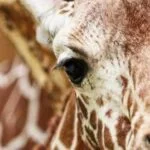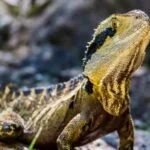Dolphin enrichment: what we know
Dr Isabella Clegg is a marine biologist and welfare scientist, and founder of the organisation Animal Welfare Expertise (AWE). Isabella discovered that while animal welfare science continued to progress, the transfer of knowledge into the various animal industries was lagging behind, so founded AWE to fill the gap and offer simple, innovative tools to evaluate animal welfare and ensure quality of life for captive and wild animals. In this blog, Dr Isabella describes her presentation on a study into dolphin enrichment, given at a recent animal enrichment conference in Japan.
I was lucky enough to attend the International Conference on Environmental Enrichment (ICEE) 2019 in Kyoto last month, on behalf of Wild Welfare. An audience of more than 200 from the zoo, aquarium, zoo association and wild animal research fields gathered to explore the themes around learning from the wild and how it can help us enrich animals’ environments in captivity.
My presentation was on the findings of a study on anticipatory behaviour in dolphins, where we used it to measure the value of different enrichments, including the human-animal relationship. While not something that is generally found in the wild, positive human-animal interactions between animal keepers and captive animals, have been shown to induce positive welfare for many different species, and with gregarious animals such as dolphins, it could be an important replacement for the number and variety of social partners they have in the wild.
The aims of the study1 were to find out how a group of captive dolphins perceived different enrichment events. While this is often evaluated through the time spent playing with an object, the new tool of measuring anticipatory behaviour can help us further understand the value of enrichment.
Anticipatory behaviour describes any action taken in preparation for an upcoming, predictable event. It has been used in terrestrial animal research where enrichment events are paired with cues, and the anticipatory behaviour for each is compared.
This is the same principle we used with the dolphins. Three events were paired with sound cues: toy enrichment, non-food trainer interactions, and a control context where nothing happened. For several months, we repeatedly presented each of these conditions after the respective sound cue, and then monitored the animals’ level of anticipation (mostly seen as a ‘surface-looking’ behaviour), after each cue was played.
The results were very interesting and surprising – I thought we might see more individual variation, but all the dolphins anticipated the interactions with their trainers the most. We also found that the higher the anticipation, the higher the participation in the event itself, suggesting that the level of anticipatory behaviour was a meaningful measure of the animals’ desire for a resource. The study suggested that similar to other animals, positive human-animal interactions between animal keepers and dolphins, can indeed be positive enrichment for dolphins in captivity.
Moving forward, the study concluded that non-food interactions with familiar humans should be offered to captive dolphins, as it seems to be a rewarding experience for them.
Enrichment programs should be variable and stimulating, and anticipatory behaviour is a useful measure for understanding what dolphins and other animals value in their environment.
While the majority of the participants at ICEE 2019 conference seemed to work on terrestrial species, I was asked some really interesting questions about this topic following my presentation and we had some great discussions. I believe anticipatory behaviour in particular has many applications across the zoo industry and can be a useful tool for measuring animal welfare and evaluating the value of the resources we provide to captive animals.
Further information:
You can listen to more of Dr Isabella’s work on YouTube and connect with her via Twitter, Instagram and Animal Welfare Expertise.
1. View the full study, named ‘Looking forward to interacting with their caretakers: dolphins’ anticipatory behaviour indicates motivation to participate in specific events’, online at: https://www.sciencedirect.com/science/article/abs/pii/S016815911830035.
Image © Pablo Heimplatz on Unsplash
The views, opinions and positions expressed by guest bloggers are theirs alone, and do not necessarily reflect the opinions of Wild Welfare or any employee thereof. Wild Welfare is not responsible for the accuracy of any of the information supplied by the guest bloggers. We accept no liability for any errors, omissions or representations. The copyright of this content belongs to the author and any liability with regards to infringement of intellectual property rights remains with them.





